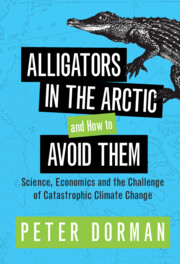 Alligators in the Arctic and How to Avoid Them
Alligators in the Arctic and How to Avoid Them Book contents
- Alligators in the Arctic and How to Avoid Them
- Alligators in the Arctic and How to Avoid Them
- Copyright page
- Dedication
- Contents
- Figures, Maps and Tables
- Preface
- Introduction
- 1 Carbon Accounting for Planet Earth
- 2 The Risks of Climate Change, or Why Carbon Budgets Need to Be Binding
- 3 Measurement
- 4 It’s about Fossil Fuels
- 5 Costs and Consequences
- 6 The Carbon Policy Toolkit
- 7 The Global Dimension
- 8 Political Economy for Alligators
- Appendix: Demystifying the Economics of Climate Change
- Notes
- References
- Index
5 - Costs and Consequences
Published online by Cambridge University Press: 14 July 2022
- Alligators in the Arctic and How to Avoid Them
- Alligators in the Arctic and How to Avoid Them
- Copyright page
- Dedication
- Contents
- Figures, Maps and Tables
- Preface
- Introduction
- 1 Carbon Accounting for Planet Earth
- 2 The Risks of Climate Change, or Why Carbon Budgets Need to Be Binding
- 3 Measurement
- 4 It’s about Fossil Fuels
- 5 Costs and Consequences
- 6 The Carbon Policy Toolkit
- 7 The Global Dimension
- 8 Political Economy for Alligators
- Appendix: Demystifying the Economics of Climate Change
- Notes
- References
- Index
Summary
Two preliminaries: US experience points to the unprecedented challenge of the rapid, drastic energy transition we face, and the labor needed to accomplish it should regarded as a cost, not a benefit. This chapter thus encourages skepticism regarding claims that the cost of meeting carbon goals will be minimal and proposes questions that should be asked of optimistic studies. The most reliable analyses draw on integrated assessment models, which show we can achieve a two-thirds chance of limiting warming to 2° at moderate cost only by greatly overshooting corresponding carbon budgets, followed by decades of negative emissions using yet-to-be developed carbon removal technologies. Not predicating policy on these technologies, however, results in very high costs. Even so, these models don’t include the likelihood that much of the existing capital stock will be uneconomic to operate at high carbon prices, a potential source of enormous disruption. The closest analogy we have is the post-1989 shock in Eastern Europe when economic opening caused widespread shutdowns. It is important to be honest about costs: rosy forecasts are unconvincing, fail to prepare us for the problems we’ll need to solve and obscure the political economy of policy change.
Keywords
- Type
- Chapter
- Information
- Alligators in the Arctic and How to Avoid ThemScience, Economics and the Challenge of Catastrophic Climate Change, pp. 111 - 149Publisher: Cambridge University PressPrint publication year: 2022
